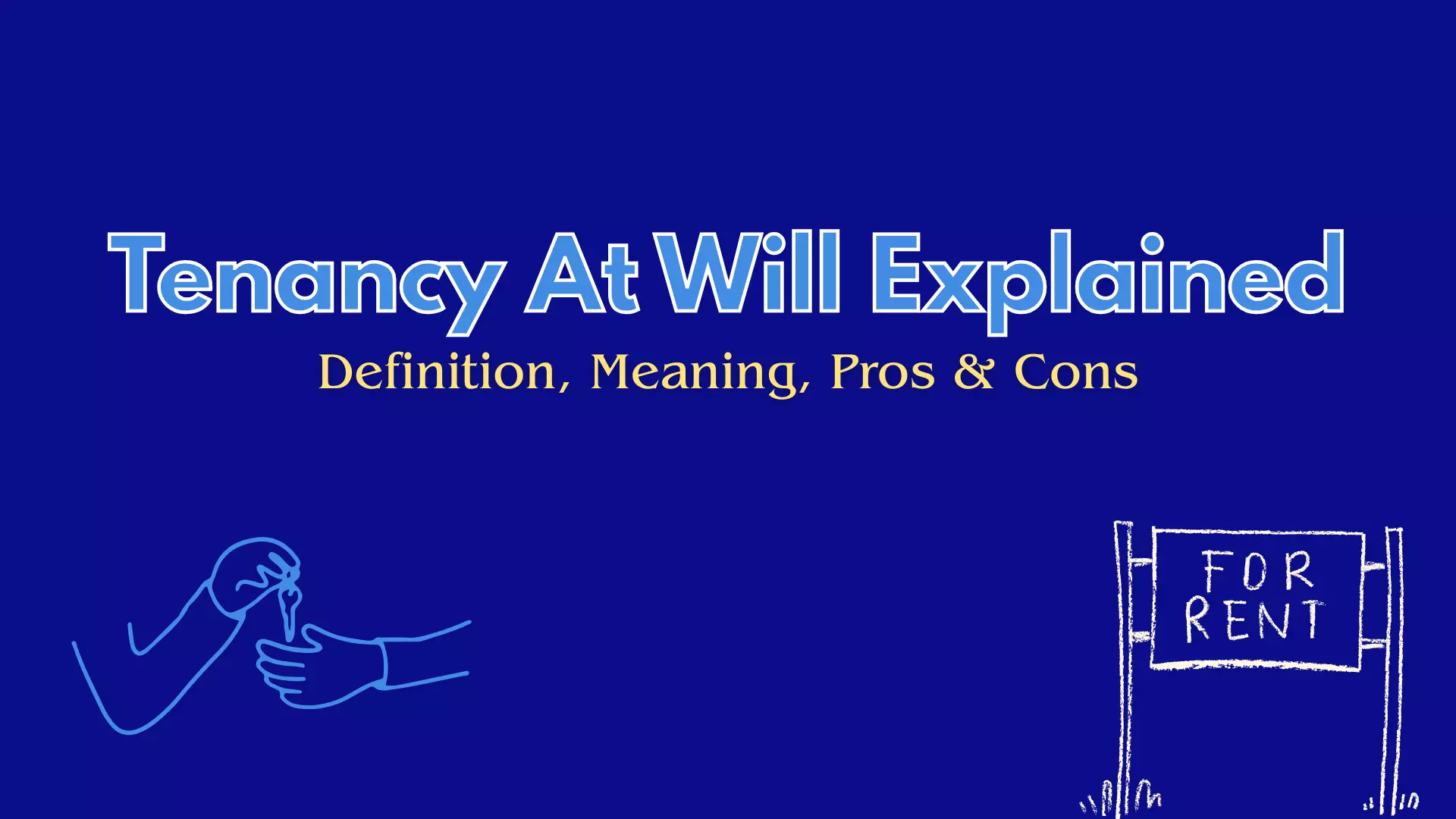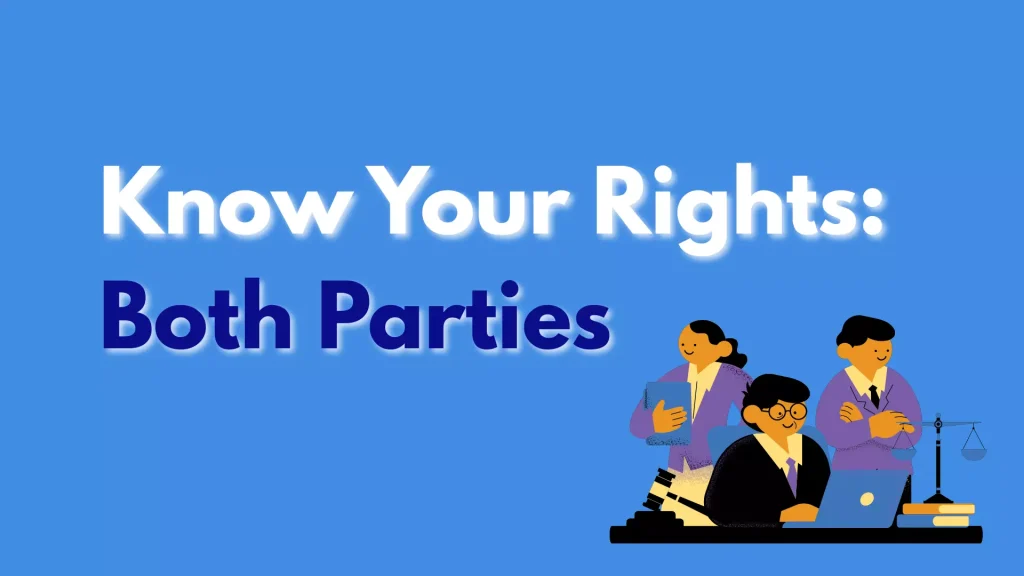The Overview of Tenancy At Will You Need – A Complete Guide

Alright, you’ve temporarily moved to a new place and there hasn’t been any written agreement or verbal agreement between you and the landlord. Now, you’re wondering what your rights are and how you should cope with the situation if the landlord asks you to pack your stuff and go away. Well, that’s a model of renting known as tenancy at will. You should understand the basics of it and your legal rights if you’re practically in it even for some time. Or you’ll stay clueless about your rental setup with your landlord.
For people like you, we have compiled all the information related to tenancy at will, i.e. what it is, how it works, what the legal rights are for both parties, how it is different from other rental agreements, its pros and cons, etc. Shall we?
What is a Tenancy At Will?
It refers to a rental setup in which either the landlord or the tenant can walk out without giving any reason to the other party. If we look at a more detailed tenancy at will definition, it’s a property tenure in which the agreement is made by both parties based on the verbal or gestural language of each other without any lease agreement. The landlord can indeed ask the tenant to vacate whenever they want, but usually you get a 30-day notice before the vacating day. Likewise, the tenant can leave the property without giving any reason to the landlord.
Now, you might have heard another term called “estate at will”, don’t get confused in both. Eventually, estate at will and tenancy at will meaning is same. In an estate at will, a tenant stays in the property of the owner with their consent but there isn’t any written agreement that permits them to end it anytime they want. It can be month-to-month payments as rent, but in some cases, the landlord doesn’t demand any charges for the stay. It could be their friends or family staying at their place for a short period. However, if you’re paying rent regularly, it gives you more legal rights as a tenant, depending on the real estate law of your government.
Legal Definition and Rights Of Both Parties
As per legal terms, tenancy at will doesn’t require the landlord and tenant to be in a lease agreement or fixed-term tenancy. It’s about the “will” of both parties, the landlord letting the tenant stay in their property. If we look at this scenario a bit more closely, it can be beneficial for both parties because of the flexibility it offers to them.
This property tenure is so dependent on the will of both parties, yet there are some universal legal rights of both the landlord and the tenant. The local, state, and national laws of tenancy at will can vary depending on the location. Here we are looking at the common universal rights in estate at will, you must know.

The Landlord Rights
The Tenant Rights
By now, you must be clear about your rights, how you’re supposed to deal with them efficiently and how it works.
Periodic Tenancy vs Tenancy at Will: What’s the Difference?
Well, these are two branches of the same tree so it’d be hell easier to understand them. Here’s a table of differentiating key factors.
Features
Tenancy at Will
Periodic Tenancy
Definition
An informal rental setup in which the tenant will live at the property with the landlord’s consent without any fixed term.
A formal agreement that reviews automatically at regular intervals (monthly, weekly, etc).
Written Agreement
Usually no written agreement
Maybe, sometimes there’s a written or verbal agreement
Lease Term
No fixed term can be ended at either party’s will
Renews automatically after each period
Notice Requirement
Evicted anytime with proper notice period (30 days)
Requires notice before the end of the rental period
Rent Payment
May or may not involve regular rent payments
Regular rent is paid on a set schedule
Stability
Less stable but more flexible
Structured and predictable
Legal Recognition
Recognized under law but varies by state
Widely recognized and often governed by clear rental laws
Common Use Case
Short-term living situations, a post-lease holdover
Month-to-month rentals, ongoing agreements
Related Terms and Concepts
While you’re researching this topic, you might want to know about a few related terms you read or heard about online but they didn’t stick quite well.
1. Lease at Will
While lease at will isn’t any legal term, some people get confused and recognize the term in the wrong context. The right term is tenancy at will, which you understand by now, we suppose. A lease is a term that refers to a written agreement for rental setups.
2. Tenancy at Sufferance
Tenancy at sufferance refers to a scenario in which a tenant isn’t leaving the property after the lease/agreement has expired, without the permission of the landlord, even after constructive eviction. For example, if the death of a landlord or a tenant has occurred and the other family doesn’t cooperate, then this situation arises. The tenants not leaving the property are also called holdover tenants.
3. Tenancy For Years
The concept of tenancy for years, aka, estate for years refers to a written agreement with a specific start and end date with the expected payment for a property’s rent. There’s no guesswork in tenancy for years, because everything is sorted out and structured before moving in.
Pros and Cons
Everything has its pros and cons in life, so does tenancy at will. Before you practically get into it, it’s crucial for you to understand its advantages and disadvantages so you can make the right decision according to your requirements and circumstances.

Pros:
Cons:
Here’s The Key Takeaway For Landlords and Tenants
Well, if you’re planning to step into a tenancy at will with your friends or relatives, you have to set boundaries and expectations with that rental setup, even if you don’t demand money. As per getting paid month-to-month for your property, you should communicate well with your tenants and cooperate with them through the process.
Contrarily, if you’re about to experience it as a tenant or at the beginning of the phase, you should know your legal rights and openly talk to the landlord about it. If things are communicated well in the early stages, even verbally, the scenario tends to become a win-win for both parties. Good luck!
